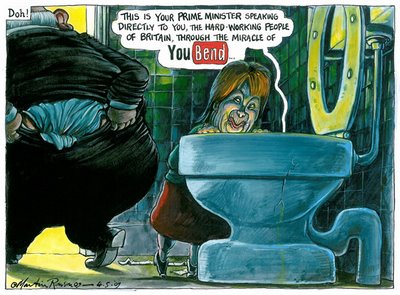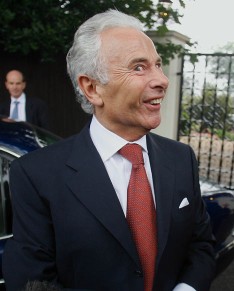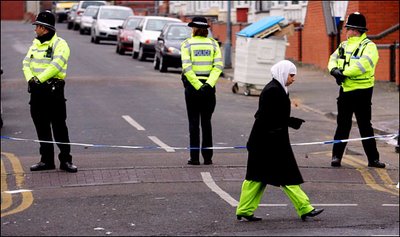Off with their heads?
 A week on from the start of the Telegraph's disclosures, and you would have thought that this would be a perfect time to begin to take stock and see how just how badly the brand of politics in general has been damaged, to take the analogy to breaking point. Yet still the story rolls on, although whether the law of diminishing returns has started to kick in yet is difficult to ascertain. Tomorrow the Telegraph, after claiming the first ministerial scalp today in Shahid Malik is set to target a Lib Dem and this blog's favourite member of parliament, Ms Nadine Dorries, who has already put up a spirited defence of herself on her blog. It's hard not to fall victim to schadenfreude, seeing two of the most downright unpleasant specimens (the other being Hazel Blears) in the Commons having to defend themselves not against accusations of being terrible politicians, which is beyond dispute, but of financial impropriety.
A week on from the start of the Telegraph's disclosures, and you would have thought that this would be a perfect time to begin to take stock and see how just how badly the brand of politics in general has been damaged, to take the analogy to breaking point. Yet still the story rolls on, although whether the law of diminishing returns has started to kick in yet is difficult to ascertain. Tomorrow the Telegraph, after claiming the first ministerial scalp today in Shahid Malik is set to target a Lib Dem and this blog's favourite member of parliament, Ms Nadine Dorries, who has already put up a spirited defence of herself on her blog. It's hard not to fall victim to schadenfreude, seeing two of the most downright unpleasant specimens (the other being Hazel Blears) in the Commons having to defend themselves not against accusations of being terrible politicians, which is beyond dispute, but of financial impropriety.As always when "crisis" descends, it's easy to lose perspective. The anger which has been expressed over the past week will subside, that much is certain. Few can sustain such fury as that expressed on phone-ins and last night's cathartic edition of Question Time for such a period of time. Again, the key period to look back to for indicators of what might happen next is the last days of the Major government, but although the allegations then were far more serious than involving "petty" abuse of expenses, there was an opposition party which was felt to be on the verge of being a viable alternative, if it was not already, as well as being one which was unblemished by the scandals. This time round, although David Cameron has put in as strong a performance as could be expected by someone who knows that he has much to potentially gain from putting the government's response to shame, his own party is only marginally less, if not as culpable as the government itself. It remains the fact that the biggest rage is being directed towards the "flippers" and profiteers, such as the previously sainted Ms Blears, but no one watching Question Time could fail to note that all politicians are taking a beating.
All of this was completely avoidable. The most mystifying thing is that a week on, parliament still refuses to get everything out in the open now and end the steady corrosion which only gets worse the longer the drip, drip of revelations continues. Second only to that has been the ineptness of Labour's attempts to get a grip on the situation, almost making you wonder whether they've completely lost all hope, both in themselves and in their chances of coming anything higher than 4th in the European elections. After all, if Shahid Malik has to stand down while his claims are investigated, why on earth are Hazel Blears and Jacqui Smith still in the cabinet, regardless of their denials and in the former's case, the brandishing of cheques? The answer might well be that they're already doomed in the next reshuffle, but the way things are going you almost wonder whether there is going to be a next reshuffle: perhaps it ought to be better to get everything over with now and call an election, rather than wait for the anger to turn instead into apathy and mistrust which will be unshiftable for years to come.
There is an argument to be made, amidst all of this, for less of a reactionary response, perhaps most forcefully made by Martin Kettle, even if his blaming of the press doesn't fully wash. Pushed down the agenda, for instance, have been examples of genuine, old style Tory corruption, only by Labour peers in the Lords. Both Lord Truscott and Lord Taylor are likely to be suspended from "the other place" after they were investigated following the Sunday Times' entrapment operation in January. Petty personal enrichment and bending if not breaking of the rules looks squeaky clean and understandable compared to the boasts made by both men of what they could do in exchange for money in the old fashioned brown envelopes. Why, also, do we not reserve such fury for the £40 million which the monarchy costs us every year, to far fewer individuals for far less work while they really do live in the lap of luxury? It also reflects badly on what it seems the public really cares about: the hate expressed over the past week seems far beyond anything that was displayed at the time of the Iraq war, when life itself was cheap to leading politicians. Some of it undoubtedly boils down to pure envy, but how on earth can that be criticised when Labour's record both on poverty has been shown to be so dismal, and now when so many are having to make do on £64 a week? On more sure ground is the hypocrisy and cant of the newspapers themselves, especially of the Mail, Telegraph and Times/Sun, all of whom are owned by individuals who are either tax exiles or do their best to avoid paying their fair share while demanding that everyone else play by the rules in the most sickening, hectoring manner.
None of the above however will make any difference for the moment, such is the apparent momentum behind the story. The fear expressed by some that this could end up turning into a "Clean Hands" style affair such as that which took place in Italy in the early 90s are probably overblown, but there is little doubt that even if there are no suicides, some now seem likely to lose their seats. The irony in all this is that while our political system is rotten in so many ways, whether down to party tribalism, whipping, or fear of offending the real power in the land, it seems likely to be the moats, trouser presses and swimming pool repairs which bring it back down to earth. In the end, we will all end up the losers in a who can wear the hairiest shirt contest, and change which fails to tackle the real problems, such as the change offered by David Cameron, will turn out be just as illusionry as that offered by New Labour.
Labels: Erminegate, Hazel Blears, Martin Kettle, MPs expenses, Nadine Dorries, parliamentary expenses, political scandals, politics




